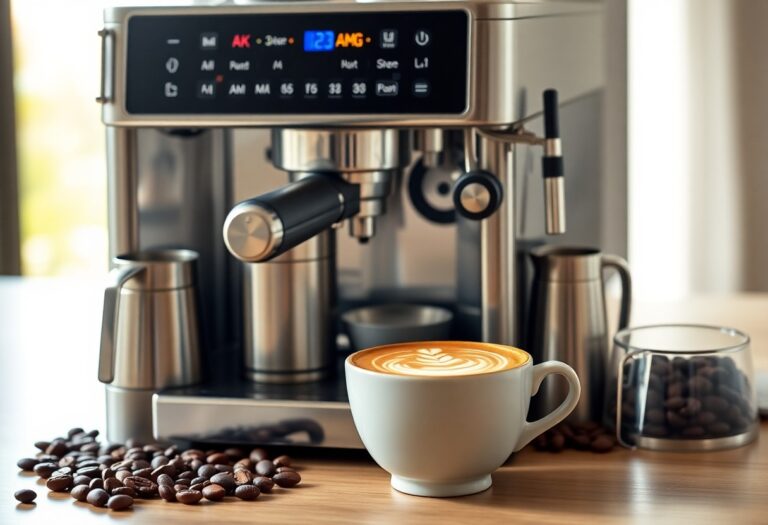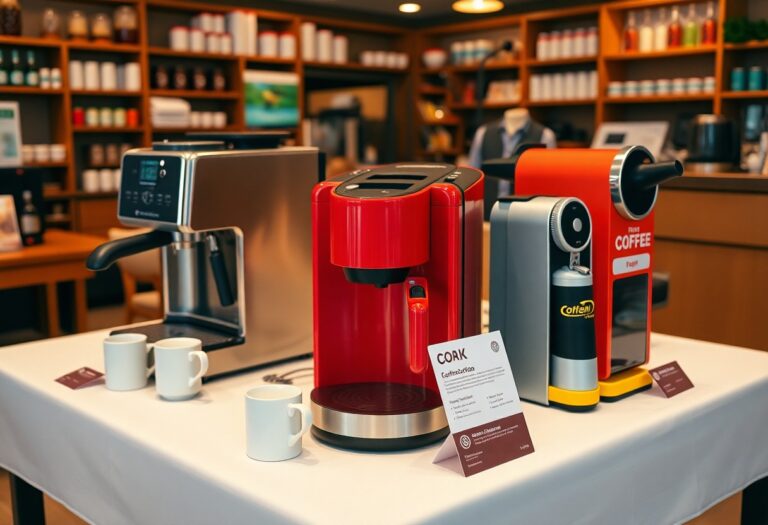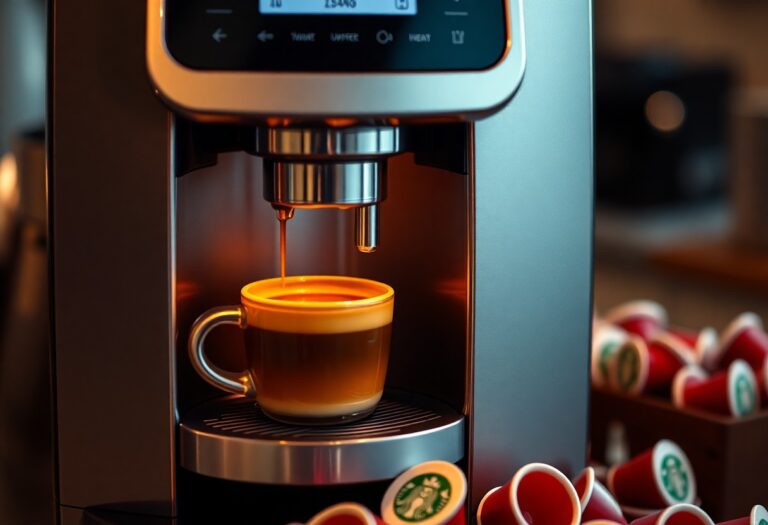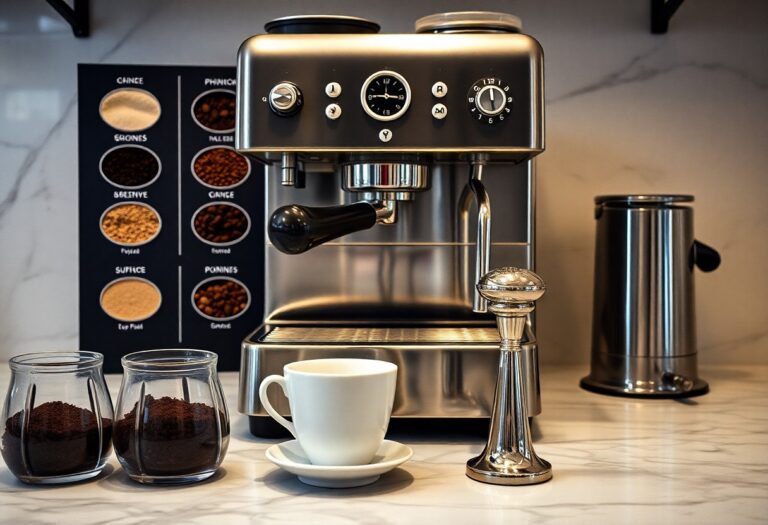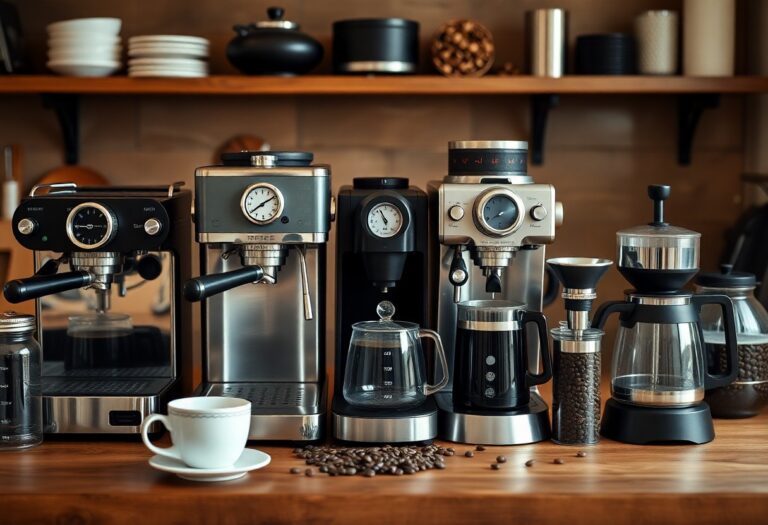What is Water Hardness in a Coffee Machine – Mineral Impact
With your coffee experience heavily influenced by the quality of water you use, understanding water hardness is imperative. The minerals like calcium and magnesium found in hard water can affect both the flavor of your brew and the lifespan of your coffee machine. High mineral content can lead to scale buildup, which can impact the efficiency and performance of your machine, resulting in costly repairs. By learning about Water Hardness, you can optimize your brewing process and enhance your coffee enjoyment.

Key Takeaways:
- Water hardness is determined by the concentration of minerals, such as calcium and magnesium, in the water used in coffee machines.
- High levels of hardness can lead to scale buildup in coffee machines, impacting performance and longevity.
- Soft water, containing fewer minerals, can improve coffee extraction and flavor, resulting in a better-tasting beverage.
- Regular descaling of coffee machines is vital to mitigate mineral accumulation from hard water.
- Using water softeners or filters can help manage water hardness and protect your coffee machine while enhancing coffee quality.
Decoding Water Hardness: Minerals at Play
Understanding water hardness means delving into the minerals affecting your coffee’s flavor and your machine’s longevity. The concentration of minerals like calcium and magnesium creates a water profile that can either enhance or diminish your coffee experience. A detailed knowledge of these components helps in selecting the right water for brewing while ensuring your coffee machine operates efficiently and remains in top condition.
The Science of Hardness: Calcium and Magnesium
Calcium and magnesium are the primary culprits behind water hardness. With high concentrations, they contribute to the overall mineral profile of your water, impacting the extraction process during brewing. Calcium enhances flavor extraction and improves the overall brewing quality, while magnesium adds to the balance and complexity of your coffee’s taste. However, excessive amounts of these minerals can lead to scale buildup in your coffee machine.
The Role of Bicarbonates in Water Chemistry
Bicarbonates are the backbone of water’s buffering capacity, which contributes to taste and stability in brewing. When present in your water, bicarbonates help to neutralize acidity, resulting in a smoother flavor profile. This equilibrium also plays a role in how well your coffee extracts, often allowing for more nuanced flavors to emerge in the final cup.
In a more technical sense, bicarbonates alter the pH level of the water, significantly affecting the coffee extraction process. They mitigate acidity levels, preventing overly sour or bitter flavors. Ideally, a balanced level of bicarbonates enhances your coffee without overshadowing the natural characteristics of the beans. Strive for a range that brings out the best in your brew without promoting scale buildup in your espresso machine, ensuring both flavor and longevity in your equipment.

How Water Hardness Affects Coffee Extraction
Your choice of water hardness plays a significant role in the extraction process, impacting the solubility of coffee compounds. Softer water can lead to under-extraction, resulting in a weak, flavorless brew. In contrast, harder water enhances solubility and can draw out more oils and flavors from the coffee grounds, providing a fuller-bodied cup. It’s vital to consider the mineral content when you’re aiming for that perfect balance in taste, as it directly influences your coffee experience.
The Influence on Flavor Profiles: A Tasting Analysis
Variations in water hardness contribute distinctively to flavor profiles in your coffee. With lower calcium and magnesium levels, you might find your coffee lacking in brightness or depth, often tasting flat. On the other hand, water with balanced hardness can accentuate sweetness and complexity, allowing for a more enjoyable and dynamic tasting experience. You might notice that your favorite beans reveal different nuances based on the mineral content of your brewing water.
The Impact on Brewing Consistency and Quality
Water hardness directly affects the consistency and quality of your brewing experience. A stable level of minerals facilitates reliable extraction across multiple brews, helping you achieve a similar taste with each cup. In contrast, fluctuating water hardness can result in varying flavors and quality, leading to potential frustration when striving for consistency. If you use tap water, it’s prudent to test your water hardness to understand how it may be influencing your daily coffee ritual.
Your coffee-making journey thrives on consistency; unreliable water hardness can leave you with uncertain results. For instance, if a barista consistently uses water with a hardness level between 80-120 ppm, they typically produce a balanced extraction with pleasant acidity. However, sudden changes in water hardness can create imbalances, where acidic notes become pronounced or sweetness diminishes, affecting overall satisfaction. Maintaining a stable mineral content helps achieve that perfect cup, each and every time.
The Deterioration Dilemma: Scale Buildup in Coffee Machines
Over time, water hardness can lead to significant scale buildup in your coffee machine, causing operational issues and affecting the taste of your brew. This accumulation of minerals, especially calcium and magnesium, can hinder proper water flow and even damage internal components, resulting in costly repairs or replacements. Addressing water hardness early on can greatly enhance the longevity of your machine and ensure you consistently enjoy that perfect cup of coffee.
Understanding Limescale Formation in Coffee Equipment
Limescale forms when hard water is heated, prompting mineral precipitation. In coffee machines, this process often occurs in heating elements and intricate water pathways. As water evaporates, minerals deposit, leading to a thick white crust that can obstruct water flow and affect brewing performance.
Consequences of Neglecting Water Hardness
Ignoring water hardness can lead to serious issues, including decreased efficiency and flavor deterioration in your coffee. In extreme cases, scale buildup might result in complete machine failure.
Failure to manage water hardness can transform your daily cup of coffee into a bitter experience. Significant limescale buildup can not only reduce the efficiency of your coffee machine but also lead to increased energy consumption due to the extra effort required to heat water. This inefficiency can result in longer brewing times and can even alter the flavor of your coffee, giving it a metallic or off taste. Additionally, the long-term neglect of scale can cause irreversible damage to your machine’s components, significant repair costs, or worse—total machine replacement. Prioritizing water hardness management safeguards your equipment and your coffee for the long haul.
Navigating Solutions: Softening Water for Optimal Brew
Softening your water is crucial for brewing the best coffee. Options range from using Dissolved Minerals in Water and Their Effect On Coffee filtration systems to adding water softeners designed specifically for coffee machines. Distilled, reverse osmosis, or filtered water can yield a more balanced brew, reducing mineral interference while maintaining flavor integrity.
Exploring Water Filtration and Softening Options
Water filtration systems offer a simple way to improve your brew by removing unwanted minerals. Options include activated carbon filters, which reduce chlorine and impurities, and reverse osmosis systems that remove nearly all dissolved solids. Each choice impacts your coffee flavor and machine longevity—assessing your water’s composition and your brewing preferences can help you select the ideal filtration method.
Balancing Mineral Content: The Ideal Water Profile for Coffee
The ideal water profile for coffee should balance key minerals like calcium, magnesium, and bicarbonate. A concentration of around 50 to 150 mg/L for calcium and magnesium collectively fosters extraction while avoiding excessive hardness. Adjusting bicarbonate levels to between 40 and 100 mg/L enhances flavor without overshadowing the coffee’s nuances. Well-balanced water brings out the best in your coffee, enhancing aroma and taste.
Considering the mineral balance in your water can transform your coffee experience. Proper calcium levels foster extraction, while lower magnesium may reduce bitterness. The nuanced presence of bicarbonates buffers the acidity, ensuring that delicate flavor notes shine through. Ideal water for brewing lies in refining these elements, aiming for a TDS (Total Dissolved Solids) level around 150-200 mg/L. Testing your water conditions and tweaking them can lead to discovering richer depths in your coffee profile, elevating your daily brew to a café-quality experience.
The Bigger Picture: Environmental and Economic Considerations
Considering the broader impact of water hardness extends beyond just your coffee experience. The robustness of your brewing water can influence water conservation efforts and the cost of equipment maintenance. By opting for softened water, you can reduce the frequency of descaling, which not only saves you money on repairs but also helps minimize water waste associated with cleaning and replacement processes. An awareness of these factors fosters responsible actions toward sustainability in both your coffee habits and environmental stewardship.
Sustainable Practices in Water Usage for Coffee Brewing
Implementing sustainable practices in your coffee brewing routine can significantly reduce water waste. Utilizing water filters and recycling water when possible ensures that you’re not drawing on more resources than necessary. Other methods include using only the required amount of water for brewing and investing in machines designed for energy and water efficiency. These measures not only enhance the quality of your brew but also contribute to a more sustainable coffee culture.
The Costs of Hard Water: A Closer Look at Maintenance
Hard water leads to increased maintenance costs in coffee machines due to its potential for scale buildup, which can compromise performance and longevity. Regular descaling treatments, which can range from $5 to $30 per interval depending on the product used, add up over time. If ignored, severe scale buildup may result in more significant repairs or even replacement of the machine, potentially costing hundreds of dollars. Hence, investing in water softening solutions upfront can yield substantial savings down the line.
The ongoing expenses associated with hard water maintenance may not only impact your wallet but also disrupt your coffee routine. Scaling can reduce water flow and complicate optimal brewing, resulting in inconsistent flavors. Moreover, the lifespan of your equipment is shortened, and unexpected breakdowns can lead to downtime that interrupts your daily coffee enjoyment. Being proactive about water quality through softening methods can help you maintain not only the integrity of your coffee but also the efficiency and durability of your machine, making it a wise choice for both your budget and your palate.
To wrap up
Summing up, understanding water hardness in your coffee machine is vital for enhancing your brewing experience. The mineral composition of your water directly impacts the flavor, extraction, and longevity of your equipment. By monitoring and adjusting water hardness, you can ensure optimal coffee taste while protecting your machine from scaling and damage. Utilizing water softeners or filters tailored to your needs can further improve both the quality of your coffee and the lifespan of your coffee machine, leading to consistently satisfying brews.
FAQ
Q: What is water hardness, and how is it measured in coffee machines?
A: Water hardness refers to the concentration of minerals, primarily calcium and magnesium, in the water used in coffee machines. It is typically measured in parts per million (PPM) or milligrams per liter (mg/L). Hard water is defined as water that has a high concentration of these minerals, while soft water has a low concentration. In coffee machines, the hardness of the water can significantly affect the brewing process, flavor extraction, and overall performance of the machine.
Q: How does water hardness affect the taste of coffee?
A: The hardness of the water can significantly influence the taste of coffee. Minerals like calcium and magnesium can enhance the extraction of flavors from the coffee grounds during brewing. However, water that is too hard may lead to over-extraction, resulting in bitter or unpleasant flavors. Conversely, water that is too soft may not effectively extract flavors, potentially resulting in a weak or bland cup of coffee. The ideal water hardness for brewing coffee often falls within a specific range, balancing mineral content for optimal flavor.
Q: What problems can hard water cause in coffee machines?
A: Hard water can lead to several problems in coffee machines, including the buildup of mineral scale on heating elements and within brewing components. This scaling can reduce the efficiency of the machine, leading to longer brewing times and potential damage if not regularly cleaned. Additionally, scale buildup can alter water flow, affecting brewing pressure and ultimately impacting the quality of the coffee brewed. Regular descaling is necessary to maintain the longevity and performance of coffee machines using hard water.
Q: How can I test the hardness of water used in my coffee machine?
A: Testing the hardness of water can be done using water hardness test strips, which are widely available at home improvement stores or online. These strips change color based on the hardness level of your water, providing an easy-to-read result. Alternatively, you can use a digital water hardness meter for more precise measurements. Knowing your water hardness level can help you adjust your coffee brewing process or decide if treatment, such as a water softener or filtration system, is needed.
Q: What steps can I take to manage water hardness in my coffee machine?
A: To manage water hardness in your coffee machine, consider the following steps: Use a water softener to reduce mineral content in your water supply. This can prevent scaling and improve coffee flavor. Alternatively, you can use filtered or bottled water with an appropriate hardness level tailored for coffee brewing. Regularly descale your coffee machine according to the manufacturer’s instructions to remove any mineral buildup. Lastly, monitor the hardness of your water periodically to ensure it stays within an optimal range for brewing excellent coffee.


